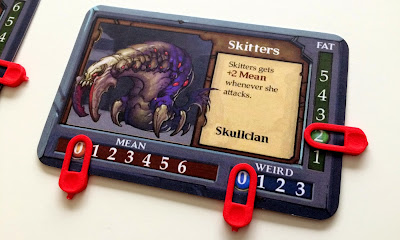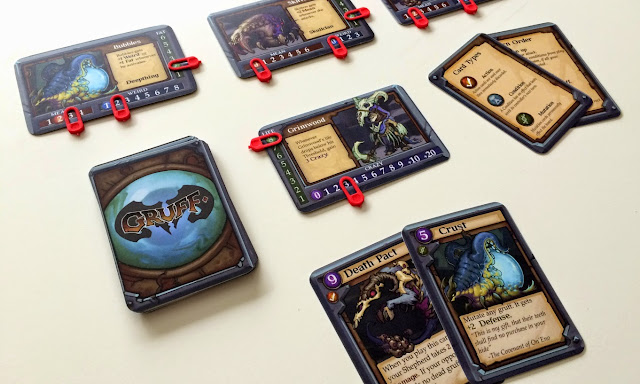
Okay it’s not quite the fairytale of the Three Billy Goats Gruff but the card game Gruff is about three billy goats and using those billy goats to hit your opponent.

In Gruff you play as a goat herd (which for some reason in this game is referred to as a shepherd) and you’ll mutate, evolve and antagonise your herd of three goats gruff to blast through your opponent’s goats and kill the opposing shepherd. Each billy goat, known as a gruff, has a very distinctive visual and playing style; the first thing you’ll notice about Gruff is its stellar graphic design.
The set I reviewed, although very pretty and professional looking was a mere slice of what the full game has to offer. Not only do you have choices over which shepherd and gruffs to take, you can also customise each gruff’s deck of cards however you choose. This produces several layers of customisation and you’ll be able to tinker with your combinations to your heart’s content. It’s easy to see how, if successful, Gruff can be expanded in the future with even more options.
To win you’ll have to carefully activate your gruffs to build their statistics, all tracked by the cool red slidey clips, and use the gruff’s weird to build your crazy. Crazy is your mana pool by another name, it gradually increases as you play the game, with the benefit that you can tweak that growth rate depending on how you evolve and utilise your gruffs. The way in which Crazy grows, and how you can manipulate it, is one of the really clever aspects of this game. More crazy allows more cards or better cards to be played from your hand, and later on in the game these cards effects can be devastating.
The other really clever aspect about Gruff is the way in which attacks are conducted. At the end of your turn you can choose to attack with your active gruff. However, the attack doesn’t get resolved until the beginning of your next turn. It gives your opponent an opportunity to manoeuvre or bolster their defending gruff or play a card to defend against the coming attack. It’s a system that removes the instant effect nature of many card games, always giving you an option before you get hit.
If you do get hit the defending gruff has to take the damage inflicted by the attacker, if the damage is less than the defending gruff’s fat the attack is blocked, more and the gruff dies and the remaining damage gets taken by the shepherd. A dead gruff is a major inconvenience and it is the part of Gruff that really gets my goat.
Once you have an advantage it becomes really easy to press that advantage and overwhelm your opponent. Kill just one opposing gruff and all of a sudden you’ve caught the opponent on the back hoof, kill two gruffs and they’re stuck with limited options and a distinct lack of offensive capability.
In almost every game I have played, as soon as a player gets this advantage they have won. Now this should be caveated by this being a limited Kickstarter prototype and it may be with a more carefully balanced deck or choice of goats and herder that this problem is mitigated, but at this time many a game has been cut short because of not having the ability to deal with dead gruffs.
Gruff is a fast light expandable card game with plenty of customisation available. The artwork and graphic design is stunning and there are also some neat design features in the game itself. However, I have trouble getting past the steamroller effect that happens if you gain the upper hand, it turns a 20 minute game of tense strategy and manoeuvring into a 5 minute game of ‘what the hell just happened there?’
Hopefully I’m wrong, and the full set of 12 gruffs and 5 shepherds mean you can adapt your deck against this issue or maybe this is a valid tactical play, and pressing your advantage early is a way to win the game but when you feel that a loss is out of your control in can be a bit gutting.
Gruff is on Kickstarter now.
This Kickstarter preview is based on a prototype version of the game provided by the publisher; the
final product may look, play or smell different to that used in this
preview.


Comments
Post a Comment